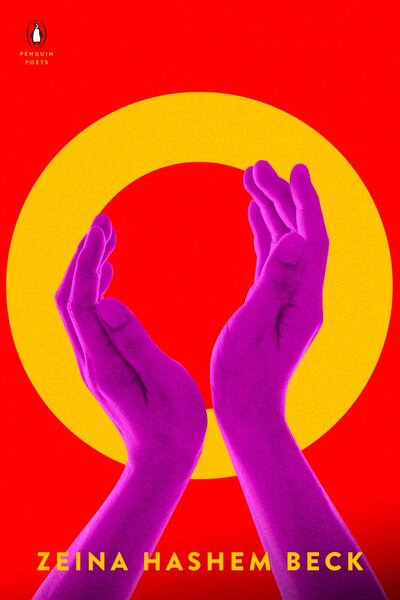“Poetry is always a vessel that’s very rooted in this world, but also takes you beyond this world,” poet Zeina Hashem Beck tells The National.
O, Hashem Beck’s third full-length poetry collection, is a vessel of experiences: mother, friend, wife, middle-aged, woman, poet.
Spanning a variety of ghazals, odes, triptychs and her own form of a duet, where Hashem Beck writes in both English and Arabic verses, O is a compilation of poems that journeys across the full spectrum of human emotions.
Through an effortlessly powerful craft of languages, Hashem Beck transforms the personal into the universal — a rare and difficult skill to master that appears to come naturally to Hashem Beck.
“I do think the personal is the universal, that's the only way.” Hashem Beck says.
“You don't sit down and think I'm going to write the universal poem that resonates with everyone on this earth. I think you just let the poem happen.”
And much like life, the poems in O unfold in fragments, streaming through narratives, piece by piece, image by image. Each poem, no matter the structure or subject, feels like an excursion into the hidden recesses of Hashem Beck’s life, which she breaks open for the light to fill.
Hashem Beck’s first collection To Live in Autumn was the winner of the 2013 Backwaters Prize and her second, Louder than Hearts, won the 2016 May Sarton New Hampshire Poetry Prize. Her poetry and prose have also found their home in The Atlantic, The New York Times, World Literature Today, the Academy of American Poets and other international publications.
O was published by Penguin Books in July, the first of Hashem Beck’s collections to be released by a major publisher. Hashem Beck is also the first Arab poet to be included in Penguin’s renowned Penguin Poets series.
“I don't know if it was part of the plan,” to be published with Penguin, Hashem Beck says. “The plan was to write poetry.”

The cover of the poetry collection is itself as compelling as the poems within it. A yellow "O" floats like a halo against a bold red background, where two purple hands elegantly reach up, echoing the circular shape of the letter.
“For the longest time, it was called Ode to the Afternoon, after one of the poems,” Hashem Beck says.
“It kind of set the tone for the collection. And then I had this thought, what if it's just the letter O, wouldn't that be interesting? As in O the lyric; the O of wonder; the O of pause; the O of surprise.”
Hashem Beck’s voice is both vulnerable and unwavering throughout, drawing the reader into a considerately curated collection of poems that co-exist in a delicate balance with one another.
“Most of the central themes had the letter O — home, ode, love, body, memory, mother, joy,” Hashem Beck says.
“There's also friendship. Love is part of friendship, right? It's not just romantic love. Romantic love isn't put in the front seat in the book.”
The collection is bittersweet: earnest and joyful, yet traumatic. Somehow, through mastery of storytelling and language, O creates a nostalgic journey that directly speaks to the reader, no matter how far removed they are from Hashem Beck’s own experiences.
Poetry’s problem has always been its perceived obscurity, its intimidating barriers. A sign of Hashem Beck’s dexterity in the medium is her patience, and her understanding of words, language, of structure. Her skill allows her vulnerabilities to lay themselves on the page, in a way that is simultaneously complex, authentic and, crucially, accessible.
“I feel that with O I really waited for the poems. I took notes and when I felt the poem wasn't ready, I didn't rush it,” Hashem Beck says.
“This doesn't mean you're not working. I’m working on it in my head, sometimes carrying the thought for a year. I would take notes, but not write, I’d tell myself, not right now. Then when I sit and write, it usually takes an entire day.”
Whether writing about watching her daughters, experiencing physical changes of her body, or longing for her homeland of Lebanon, Hashem Beck creates images that leap out of the page.
Although the collection is not devoted to the particulars of Arab identity, Hashem Beck’s intangible “Arabness", whether through language, geo-politics or social issues, is always present.
“I am very much grounded in Arab culture. I come from that culture,” she says.
“It will always seep into my poems, because this is where I'm from. It's in my blood. But this doesn't mean I'm always directly writing about it.”
And this is one of the pleasures in reading Hashem Beck. While directly writing of her joy and worries, it is also what seeps from the other parts of her that makes O a lyrical, unrestrained and arresting experience.






















